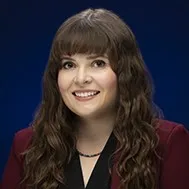
Bailey Benedict
Contact
Office Hours
Bio
Welcome to my faculty profile! My name is Dr. Bailey Benedict, and I use she/her/hers pronouns.
In the sections below, you can learn more about my education, teaching experience, and research specializations.
In my free time, I enjoy road tripping (I once visited 12 National Parks in 3 weeks), going thrift shopping, attending community events, and doing lots of nerdy things, like listening to podcasts, doing crafts, and reading dystopian novels and autobiographies. I am excited for warmer weather in the Inland Empire after living exclusively in the Midwest!
More information about me is available on my website, LinkedIn, or Google Scholar.
You can also find me on TikTok, Instagram, and YouTube at @bizcommprof.
Education
Ph.D. in Organizational Communication - Purdue University (2021)
M.A. in Communication - University of Wisconsin-Milwaukee (2017)
B.A. in Communication Studies - University of Wisconsin-La Crosse (2015)
Courses/Teaching
MGMT 3500: Applied Communication
ADMN 6020: Advanced Managerial Communications
Prior to joining CSUSB, I was an Assistant Director for Introduction to Presentational Speaking at Purdue University, one of the largest basic communication courses in the world; was a consultant in the Purdue Presentation Center (like The Speaking Center at JHBC); and taught classes like Small Group Communication, Organizational Communication, and Business and Professional Communication in traditional and online modalities.
Specialization
My research centers on how individuals and communities organize social networks to manage uncertainty and enact resilience, especially when enduring or overcoming hardships like natural disasters. As a social scientist, I study human behavior, development, and societies with the goal of producing replicable knowledge. In other words, if I study a certain social phenomenon in a specific context and come to a defined conclusion, I hope other researchers would come to the same or a similar conclusion if they replicated (or repeated) my study.
I worked on two interdisciplinary, multi-university projects funded by the National Science Foundation to study hurricane preparation, evacuation, and recovery. My dissertation examined how Facebook Groups offered spaces for community organizing for disaster relief and facilitated recovery after the Camp Fire in California.
I use multiple and mixed research methods, especially surveys using egocentric network analysis and structural equation modeling. These are statistical methods that help me understand the relationships held by an entity of interest (i.e., the ego), like the people who provide social support to an individual survivor after a natural disaster. Statistical models allow me to examine the impact of predictor variables on an outcome variable when other factors are controlled, such as how social support influences resilience when the amount of damage to one's home is held constant.
Selected Publications
Benedict, B. C. (2024). The tensions of crowdsourcing resilience organizing in disaster-specific Facebook groups after the Camp Fire. Risk, Hazards & Crisis in Public Policy, 15(2), 261-283. https://doi.org/10.1002/rhc3.12299
Benedict, B. C., Lee, S., Jarvis, C. M., Siebeneck, L. K., & Wolfe, R. (2023). Utilizing qualitative data for social network analysis in disaster research: Opportunities, challenges, and an illustration. Disasters. https://doi.org/10.1111/disa.12605
Benedict, B. C. (2022). Entanglements of identity and resilience in the Camp Fire’s network of disaster-specific Facebook groups. Media and Communication, 10(2), 5-17. https://doi.org/10.17645/mac.v10i2.5038
Lee, S., Benedict, B. C., Ge, Y., Murray-Tuite, P., & Ukkusuri, S. V. (2021). An application of media and network multiplexity theory to the structure and perceptions of information environments in hurricane evacuation. Journal of the Association for Information Science and Technology, 72(7), 885-900. https://doi.org/10.1002/asi.24456
Benedict, B. C. (2020). Using vision boards to reflect on relevant experiences and envision ideal futures. College Teaching. https://doi.org/10.1080/87567555.2020.1850411
Benedict, B. C. (2020). Examining the experiences of remaining employees after a coworker dismissal: Initial message characteristics, information seeking, uncertainty, and perceived social costs. Management Communication Quarterly, 34(4), 495-526. https://doi.org/10.1177/0893318920949327
Lee, S., Benedict, B. C., Jarvis, C. M., Siebeneck, L., & Kuenanz, B-J. (2020). Support and barriers in long-term recovery after Hurricane Sandy: Improvisation as a communicative process of resilience. Journal of Applied Communication Research, 48(4), 438-458. https://doi.org/10.1080/00909882.2020.1797142
Note: DO NOT pay to read journal articles by professors! Most scholars, myself included, can send you a PDF for free.